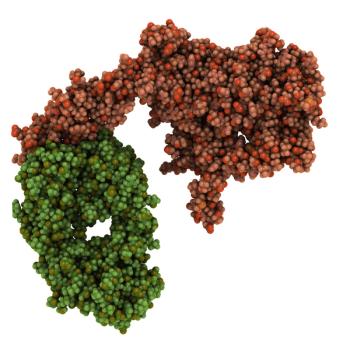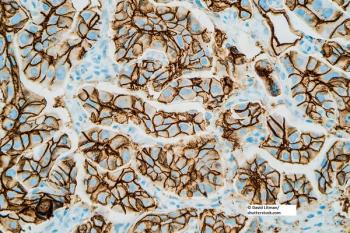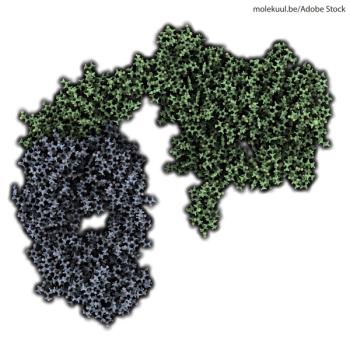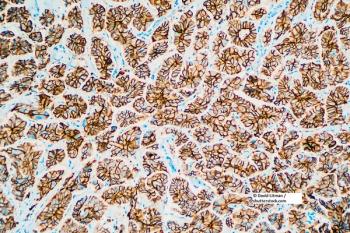
HER2-Positive Breast Cancer
Latest News

Latest Videos

CME Content
More News

Recommendations for managing 2 patient cases specific to HER2-positive metastatic breast cancer and optimizing therapy for specific patient populations within the HER2-positive space based on emerging treatments and changes to standards of care.

Results from the phase 3 SOPHIA trial demonstrated that margetuximab plus chemotherapy had an acceptable safety profile which was comparable to that observed with trastuzumab plus chemotherapy.

The randomized, open-label, phase 3 FeDeriCa trial tested the safety profile of pertuzumab and trastuzumab plus hyaluronidase-zzxf in 500 patients with HER2-positive early breast cancer.

Register for CancerNetwork's live, interactive event featuring leaders in oncology reviewing and discussing patient cases in breast cancer.

ARX788 received a nod from the FDA early in 2021 based on promising preclinical and phase 1 trial data demonstrating its efficacy in patients with HER2-positive breast cancer following progression on other agents.

The FDA approved margetuximab-cmkb (Margenza) in combination with chemotherapy for the treatment of adult patients with metastatic HER2-positive breast cancer who have received 2 or more prior anti-HER2 regimens, at least 1 of which was for metastatic disease.

Impressive signals of efficacy, durable responses, overall survival rates, and a tolerable safety profile were all found for fam-trastuzumab deruxtecan-nxki to treat patients with HER2-positive metastatic breast cancer.

The combination use of neoadjuvant paclitaxel, trastuzumab, and pertuzumab followed by adjuvant trastuzumab for patients with pathologic complete response or followed by adjuvant dose-dense anthracycline/cyclophosphamide plus T-DM1 for patients with residual disease offered the highest health benefits and lowest costs.

Investigators suggested that guidelines which recommend initiating screening mammography at age 50 may be putting Black women at a disadvantage, and screening should thus begin by age 40.

The DESTINY-Breast05 trial will investigate fam-trastuzumab deruxtecan-nxki (Enhertu) versus ado-trastuzumab emtansine (T-DM1) as adjuvant therapy in patients with HER2-positive early breast cancer who have a high risk of disease recurrence and residual invasive disease in the breast or axillary lymph nodes after receiving neoadjuvant therapy.

A study which evaluated lapatinib (Tykerb) and trastuzumab (Herceptin) given prior to surgery in patients with early HER2-positive breast cancer revealed that women who had a pathological complete response survived longer without the cancer returning than those who did not.

The breast cancer expert discussed the changes he has made in treating this patient population as a result of the COVID-19 pandemic.

The addition of tucatinib to trastuzumab and capecitabine in patients with HER2-positive metastatic breast cancer with and without brain metastases resulted in statistically significant and clinically meaningful improvements in progression-free and overall survival.

The study is designed to evaluate the safety and tolerability, pharmacodynamics, and preliminary efficacy of ACE1702 in patients with advanced or metastatic HER2-expressing solid tumors.

The breast cancer expert discussed research recently published in Cancer Medicine, which suggested that delays in adjuvant chemotherapy are associated with worse survival in this patient population.

Researchers indicated that these findings suggest providers should avoid delays and begin chemotherapy no later than 90 days after surgery, regardless of the patient’s breast cancer subtype or age.

In addition to being approved to detect the HER2 biomarker in breast cancer, the assay was approved as a companion diagnostic for trastuzumab therapy.

Black Diamond Therapeutics announced that the FDA granted fast track designation to BDTX-189 for the treatment of adult patients with solid tumors harboring an allosteric HER2 mutation or an EGFR or HER2 Exon 20 insertion mutation.

The FDA approved phesgo for injection under the skin to treat adult patients with early and metastatic HER2-positive breast cancer.

The FDA has cleared an investigational new drug application for BPX-603, a GoCAR-T product candidate targeting solid tumors that express human epidermal growth factor receptor 2.

Tucatinib in combination with trastuzumab and capecitabine yielded significant intracranial responses in patients with previously treated HER2-positive metastatic breast cancer and brain metastases.

A recent study found 32 new sites on the human genome where variations in a woman’s DNA could alter her risk level, both increase and decrease, of getting breast cancer.

The multi-center trial is comprised of 2 phases, with phase I determining the maximum tolerated dose of palbociclib and phase II determining the clinical benefit rate of treatment with anastrozole, palbociclib, trastuzumab, and pertuzumab.

As prospective clinical trials continue to accrue data, the researchers indicated that this data may help clinicians in decision-making regarding adjuvant systemic therapy for patients with small HR-positive, ERBB2-positive breast cancers.

This study observed a positive association between Indigenous American genetic ancestry and HER2-positive breast cancer, suggesting that the high incidence of HER2-positive subtypes in Latinas may be due to population and subtype-specific genetic risk variants.







































